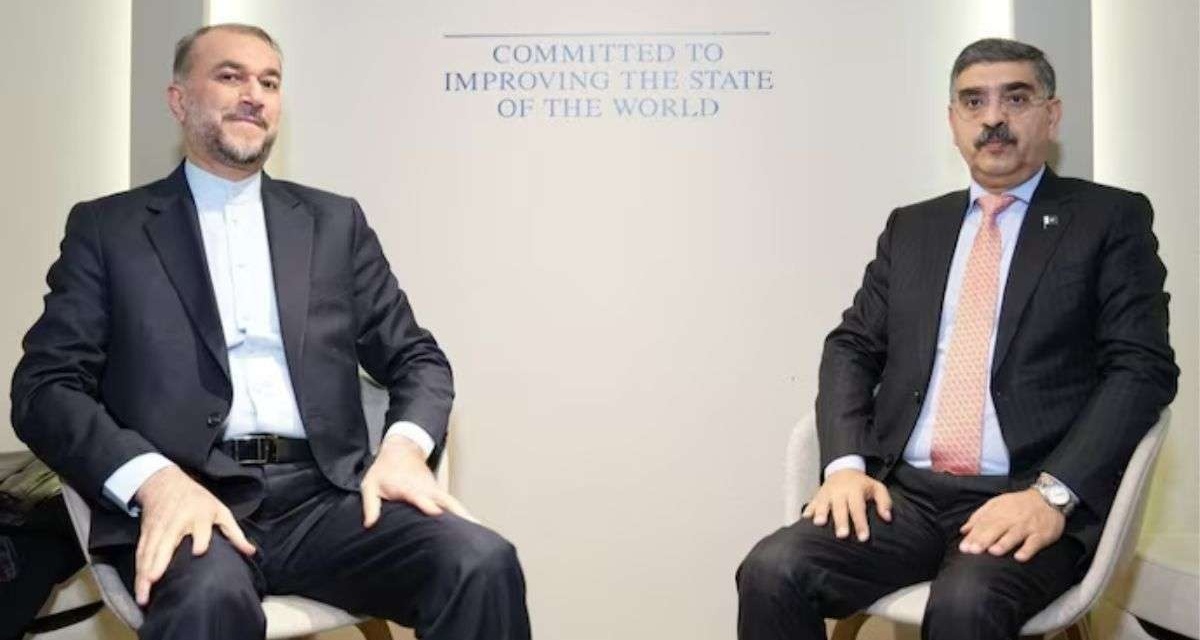Iran Foreign Minister Hossein Amir-Abdollahian and Pakistan Prime Minister Anwaar-ul-Haq Kakar at the World Economic Forum in Davos, Switzerland, January 16, 2024
See also Iran’s Missiles Kill Multi-Millionaire Businessman in Iraq and 2 Children in Pakistan
UPDATE, JAN 20:
Iran Foreign Minister Hossein Amir-Abdollahian, speaking with Pakistani Prime Minister Anwaar-ul-Haq Kakar on Friday, reportedly said he did not know in advance of Tuesday’s Iranian cross-border missile strikes into Pakistan.
The statement raises the possibility that Iran’s Revolutionary Guards — and perhaps other part of the Iranian regime — kept the Foreign Ministry in the dark about the operation. The strikes were carried out only hours after Amir-Abdollahian met Kakar at the World Economic Forum in Davos, Switzerland.
Pakistan tried to ease tensions on Friday, as the National Security Committee gathered to review the situation. Foreign Minister Jalil Abbas Jilani told his Turkish counterpart, “Pakistan has no interest or desire in escalation.”
After Jilani spoke with Amir-Abdollahian, the Pakistan Foreign Ministry said, “The two Foreign Ministers agreed that working level cooperation and close coordination on counter-terrorism and other aspects of mutual concern should be strengthened.”
UPDATE 0932 GMT:
An Iranian official has raised the death toll to nine from cross-border Pakistani strikes.
Alireza Marhamati, the deputy governor of Sistan and Baluchestan Province, said two men were slain in the city of Saravan.
Marhamati earlier claimed that three women and four children were killed.
ORIGINAL ENTRY: Pakistan has carried out retaliatory strikes on southeast Iran, just over a day after Tehran’s attacks on Pakistani territory.
Trying to project strength after the Israeli assassination of its senior commander in Syria and an ISIS attack in south-central Iran killing at least 91 civilians, the Iranian military killed several people — including a multi-millionaire businessman and members of his family — in northern Iraq late Monday.
A day later, Iran fired missiles and drones across the border into the Balochistan Province of Pakistan. The Pakistani Foreign Ministry said two children were killed and three other people injured.
Tehran claimed that the strikes were on bases of Jaish al-Adl, which has carried out insurgent attacks for years in Sistan and Baluchestan Province in southeast Iran.
Early Thursday, “a series of highly coordinated and specifically targeted precision military strikes against terrorist hideouts in the Sistan and Balochistan Province of Iran”, announced the Pakistani Foreign Ministry.
It claimed a number of “terrorists” were killed during the operation based on “credible intelligence of impending large-scale terrorist activities” by Pakistani separatists given a safe haven inside Iran’s borders.
Local media in Iran claimed at least three women and four children, all “non-Iranian nationals”, were killed in a border village. The Iranian Foreign Ministry has summoned the Pakistani chargé d’affaires.
Will Iran Escalate Further in Pakistan and Iraq?
Pakistan had warned of “serious consequences” for the “illegal” violation of its airspace on Tuesday. It recalled the Pakistani ambassador from Tehran and expelled the Iranian envoy in Islamabad. Joint naval exercises were called off, even as Iranian State media featured headlines about the operations.
Iran’s cross-border strikes were launched hours after a meeting between Iranian Foreign Minister Hossein Amir-Abdollahian and Pakistan Prime Minister Anwaar-ul-Haq Kakar at the World Economic Forum in Davos, Switzerland.
On Wednesday, Amir-Abdollahian tried to ease tensions over the attacks. He insisted, despite the reports of slain children and wounded civilians, that the assault was only on Jaish al-Udl “terrorists”: “None of the nationals of the friendly and brotherly country of Pakistan were targeted by Iranian missiles and drones.”
In a phone call with his Pakistani counterpart Jalil Abbas Jilani, Amir-Abdollahian maintained that the attacks were for good of both countries: “Iran’s security has repeatedly been threatened by this Iranian terrorist grouplet from the Pakistani soil.”
At the same time, the Iranian regime maintained its hostile rhetoric over Iraqi Kurdistan. State outlets continued to proclaim that Monday’s missiles were aimed at an “Israeli espionage hub”.
The Secretary of Iran’s Supreme National Security Council, Ali-Akbar Ahmadian warned Iraqi National Security Adviser Qasim al-Araji on Wednesday, “Any action against the Iranian nation and government by the Israeli regime, no matter which country the threats come from, will not be tolerated in any way.”
Defense Minister Mohammad Reza Ashtiani said in similar remarks on Wednesday echoed that Iran would carry out a “proportionate, decisive and strong” response to any “threat”.


Tensions Remain As Pakistan Arrests Alleged Iran-Backed Militant
https://www.iranintl.com/en/202401229239
Stockholm Says Swedish-Iranian Man Detained in Iran
https://www.rferl.org/a/stockholm-says-swedish-iranian-man-detained-in-iran/32782235.html
Iranian Armed Forces Kick Off Drills along Southern Coastal Strip
https://iranwire.com/en/news/124455-iranian-armed-forces-kick-off-drills-along-southern-coastal-strip/
One might ask, Chahbahr has a full fledged radar site to cover south east of iran, and they were prepared for this operation in the area. And yet, the mighty mullah state and irgc could not detect the fighter jets that crossed the boarder until “explosions were heard”….
But hey, the mighty irgc force can fire shut guns in protesters face. That is “eghtedar”(power), isn’t it?
Alarm Raised over Imminent Execution of at least 12 Prisoners in Iran
https://iranwire.com/en/prisoners/124456-alarm-raised-over-imminent-execution-of-at-least-12-prisoners-in-iran/
khamenei, “rahbare farzaneh”(wise leader), hich gohi ke nemitooneh bokhoreh(can’t respond to israel), instead he kills innocent people. Killing children in iraq calling them spies, killing children in pakistan calling them terrorists, bombing empty building in syria, or executing these protesters for bogus charges. If non of that works for khamenei he can destorys bahai’s lives for no reason at all….. Any distraction that he can think of…..